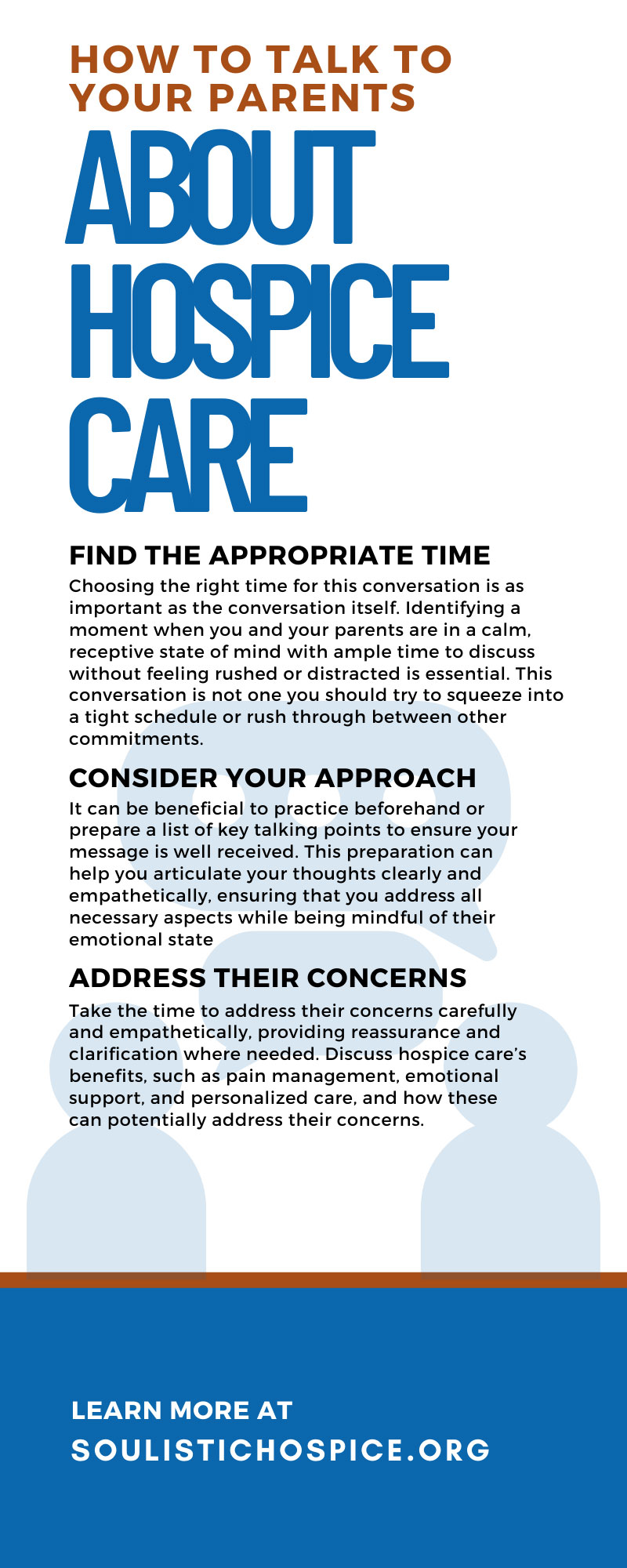
Discussing hospice care with your aging parents is an incredibly sensitive and challenging task. The conversation calls for compassion, understanding, and ample preparation. Below, we offer some guidance on how to talk to your parents about hospice care to help you ensure that the conversation is informative but also respectful and empathetic. We aim to help you navigate this complex process gracefully and give your loved ones the dignity and care they deserve during their final journey.
Why This Conversation Is Important
The conversation about hospice care with your parents is not just a practical necessity—it is an act of love, respect, and compassion. It allows us to acknowledge the inevitable reality of life with dignity and grace. It’s crucial because it enables your parents to express their wishes and concerns about end-of-life care, ensuring comfort and peace in their final phase of life.
You can reduce uncertainty, anxiety, and potential conflicts by proactively discussing hospice care, ensuring a smoother transition when the time comes. This conversation, although challenging, is a crucial step toward providing the best possible care for your loved ones during their final journey.
Find the Appropriate Time
Choosing the right time for this conversation is as important as the conversation itself. Identifying a moment when you and your parents are in a calm, receptive state of mind with ample time to discuss without feeling rushed or distracted is essential. This conversation is not one you should try to squeeze into a tight schedule or rush through between other commitments.
Instead, it should occur in a quiet, comfortable location and at a time that suits everyone involved. You’re signaling the conversation’s importance and showing respect for your parents’ feelings and thoughts by setting aside a specific period for it. This thoughtfulness can create a safe space for open and honest communication, allowing your loved ones to voice their concerns, fears, desires, and preferences regarding their end-of-life care.
Consider Your Approach
How you approach the conversation about hospice care with your parents can significantly influence the outcome and how they perceive the situation. It’s imperative to approach this discussion with empathy, understanding, and utmost respect for their feelings. You don’t want to appear cold, dismissive or inconsiderate.
It can be beneficial to practice beforehand or prepare a list of key talking points to ensure your message is well received. This preparation can help you articulate your thoughts clearly and empathetically, ensuring that you address all necessary aspects while being mindful of their emotional state. Remember, this conversation is about them and their needs—your approach should reflect this understanding and convey your genuine care and concern for their wellbeing.
Address Their Concerns
Give your parents time to discuss their thoughts and concerns about hospice care during the conversation. Listening with full attention without interruption allows them to express their fears, uncertainties, and questions about this transition.
Take the time to address their concerns carefully and empathetically, providing reassurance and clarification where needed. Discuss hospice care’s benefits, such as pain management, emotional support, and personalized care, and how these can potentially address their concerns.
Remember, the goal is not to persuade them but to ensure they have all the necessary information to make an informed decision. You demonstrate your respect for their autonomy and facilitate a more open, understanding dialogue about their end-of-life care by giving them the space to express their feelings and address their concerns.
Discuss Care Options
Discussing the various care options available should be an integral part of the conversation about hospice care. Providing a comprehensive overview of the different types of hospice care allows your parents to understand the extent of their choices. It helps them make informed decisions that align with their comfort, needs, and preferences.
For instance, they may prefer in-home hospice care, which allows them to stay in a familiar setting during their final days, surrounded by their belongings and memories. On the other hand, they might feel more comfortable opting for a hospice facility, where they can receive round-the-clock medical attention and support. Hospitals, nursing homes, and residential care facilities also provide hospice care.
Discussing these options, their benefits, and potential drawbacks gives your parents a complete picture of what to expect from hospice care. This process allows them to consider their preferences thoroughly and make a choice that truly resonates with their wishes for their end-of-life care experience.
Respect Their Wishes
Respecting your parents’ wishes is paramount during and after the conversation about hospice care. This process is deeply personal and emotional, and it’s crucial to remember that the final decision rests with them. It’s not about what we believe is the best course of action but about honoring their choices, comfort, and autonomy.
Even after you’ve laid out all the options, benefits, and potential drawbacks, your parents may need time to digest the information and weigh their options. Be patient and understanding as they take the time necessary to come to a final decision. Give them the space they need to process their feelings and thoughts without pressure.
You can always schedule a follow-up conversation if they need more time or require further clarification. This approach not only demonstrates your respect for their autonomy and dignity but also reinforces your support for their well-being. The goal is to ensure they feel heard, valued, and cared for during this critical phase of their life, and respecting their wishes is a significant step toward achieving this aim.
We hope that our guide on how to talk to your parents about hospice care will help you plan and prepare for this conversation with confidence. Remember, this talk is about compassion, understanding, and respect. It’s about acknowledging life’s reality and honoring your loved ones’ wishes and comfort. This conversation is not easy, but it’s necessary. Contact Soulistic Hospice today to learn about our personal care services in Arizona. With the right preparation, timing, and approach, you can ensure your parents’ final journey is as comfortable, dignified, and peaceful as possible. This conversation is a testament to the love and respect you hold for your parents, and while it might be difficult, it’s ultimately a profound act of compassion.









